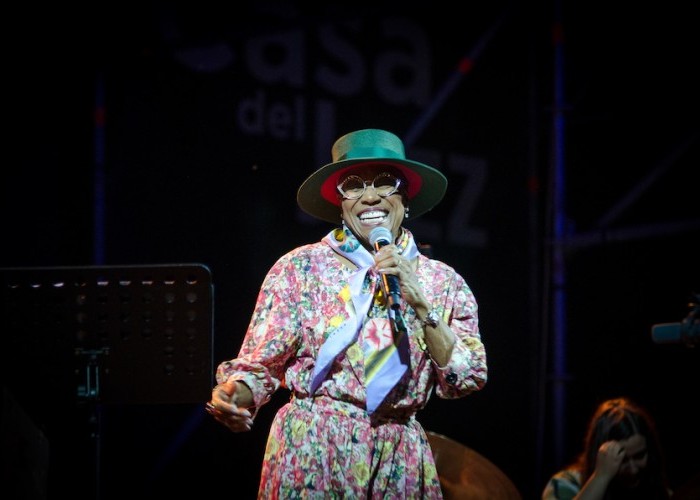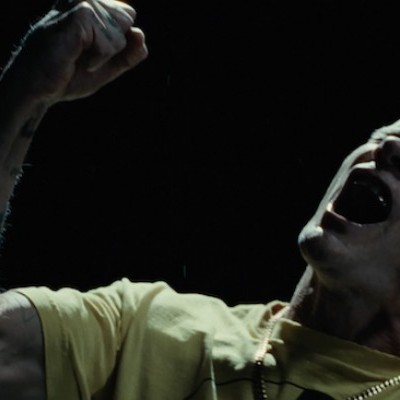Dec 9, 2025 12:28 PM
In Memoriam: Gordon Goodwin, 1954–2025
Gordon Goodwin, an award-winning saxophonist, pianist, bandleader, composer and arranger, died Dec. 8 in Los Angeles.…

Dee Dee Bridgewater returned to live performing in Rome, with a few butterflies and a beautiful set.
(Photo: Roberto Manzi)On a warm July night in central Rome, Dee Dee Bridgewater, wearing a long, floral print dress and broad-rimmed, dark green hat, stepped onto the outdoor stage of the Casa del Jazz, an estate that includes a luxurious villa and a six-acre park. The property, which the state confiscated in 2005 from Enrico Nicoletti, the alleged Mafia boss of Rome’s notorious Magliana Gang, now hosts some of the biggest international names in jazz.
It was the start of Bridgewater’s Italian tour, her first live shows in Europe since pre-pandemic days, and she was clearly anxious. The celebrated chanteuse, a 2017 NEA Jazz Master, had spent most of the last year and a half staying very close to her New Orleans home. Now she was testing out her sea legs.
“I’m very nervous. I think I’m gonna forget everybody’s last names,” she said. She had put together a band of Italian jazz musicians for the tour, and this was their first real test — and hers. At first, she did seem a little shaky, consulting her notes to introduce the band and, at one point, introducing the wrong song, then correcting herself. “I told you I was nervous.” After she managed to make it through the list of her five Italian sidemen and women, she cracked, “And my name is Gloria Gaynor.”
But Bridgewater, who is among the most seasoned bandleaders in the business, soon found her composure, singing strongly and establishing a warm rapport with the enthusiastic audience, which was limited to about 600 (out of 1,000 seats) and socially distanced by the management into singles and couples.
“Because of the pandemic,” she said, “I did not want to be responsible for bringing American musicians who are not vaccinated to Italy. So I said, let’s put together an Italian band. I am very proud to be with these fine musicians. It is my first time working with an Italian band, and I’m ecstatic.” Her young band — Claudio Filippini (piano), Mirco Rubegni (trumpet), Michele Polga (tenor saxophone), Rosa Brunello (bass) and Evita Polidoro (drums) — proved its worth from the first number, sounding well-rehearsed and playing expertly.
The program, consisting mostly of songs she had not previously sung live, centered on classics by friends with whom she has had fruitful associations: Chick Corea, Horace Silver, Wayne Shorter and Thelonious Monk.
She began with two songs from Stanley Clarke’s 1973 solo debut album, which featured Corea, and on which she sang with the distinguished jazz singer Andy Bey. In the opener, Corea’s “Sea Journey,” the band stepped up boldly to the churning, funky challenge of the piece, including a high-flying, effects-enhanced trumpet solo. Clarke’s “Unexpected Days” included a standout piano solo by Fillipini.
By the third tune, Silver’s “Doodlin’,” the band had reached its stride. It was the first of three songs that appeared on her 1995 tribute album to the pianist-composer. Bridgewater sang the lyric, which she noted Silver had written expressly for her, and scatted with her usual authority and elan.
As she introduced Monk’s “’Round Midnight,” she elaborated on her emotional state, obliquely referencing the pandemic and recent social unrest in America. “This is a very uncertain and unstable period. It’s my first time coming back to Europe in two years, and I was really afraid. I didn’t want to take that long flight. I was dealing with all of the ramifications of the year-and-a-half of absolute insanity that we have had in in the United States — the un-United States. Doing this is like a healing balm, and with each song I feel a little better about life, music and us as human beings.”
She hadn’t previously attempted the Monk classic live; she performed it hauntingly in a piano trio arrangement based on Carmen McRae’s version on Carmen Sings Monk, with an additional lyric by Jon Hendricks.
After a bracing version of another Silver classic, “Nica’s Dream,” featuring a sprightly trumpet solo by Rubegni, she reached one of the evening’s high points: Wayne Shorter’s “Footprints,” which showcased her own lyric, an homage to her Nigerian and Malian ancestry. She recounted how she had called Shorter to try to win his approval for her evocative lyric (“Birthplace of nations/ Where life had its beginning”). “He told me I was the first person who seemed to understand what was going through his mind when he wrote it,” she said, giving her permission to re-title the song “Long Time Ago.” The band took it slowly, accentuating the music’s African rhythms, and featuring an affecting, searching piano solo by Fillipini.
After another Silver classic, “Song For My Father,” and another Clarke tune, “Butterfly Dreams,” it was time for “Blue Monk,” with Abbey Lincoln’s famous lyric about “Monk-ery.” The blues fit the singer and the band like a pair of comfy slippers. The audience responded warmly to Bridgewater’s wah-wah trombone scat solo; she then traded fours with the Rubegni and Polga.
She ended with a tour de force: Corea’s “Spain.” In her introduction, she recalled the last time she saw the late pianist, at a show by his Spanish Heart band, celebrating what became his final album, Antidote. “I was absolutely mesmerized,” she said. “I followed him around after the show. I said, ‘Chick, you gotta do this as a movie!’ So we hung out for about an hour, and he just let me spew off at the mouth, and then he said, ‘Dee Dee, I really love you. And here are some cookies that [his wife] Gayle told me to give you.’ And that was the last time I saw Chick.”
Singing Ann Hampton Callaway’s spot-on lyric (“The sounds of our hearts/ Beat like castanets”), she captured the Spanish soul of the celebrated piece, rendering the melody with precision.
The delightful, funky encore was “Space Captain” (of all things), Matthew Moore’s song from Joe Cocker’s Mad Dogs And Englishmen album; her version, however, was inspired by Herbie Hancock’s version of the song for his The Imagine Project. The band played it with relish, especially bassist Brunello, who switched to electric and bounded around the stage, seemingly unable to contain her glee. The singer became more of a gospel/blues shouter, the song bringing out the Mavis Staples in her voice.
She left the grateful crowd on an optimistic note, the song’s chorus a pithy message summing up the past consequential year: “Learnin’ to live together till we die.” DB

Goodwin was one of the most acclaimed, successful and influential jazz musicians of his generation.
Dec 9, 2025 12:28 PM
Gordon Goodwin, an award-winning saxophonist, pianist, bandleader, composer and arranger, died Dec. 8 in Los Angeles.…

Belá Fleck during an interview with Fredrika Whitfield on CNN.
Jan 13, 2026 2:09 PM
The fallout from the renaming of the John F. Kennedy Center for the Performing Arts to include President Donald…

The success of Oregon’s first album, 1971’s Music Of Another Present Era, allowed Towner to establish a solo career.
Jan 19, 2026 5:02 PM
Ralph Towner, a guitarist and composer who blended multiple genres, including jazz — and throughout them all remained…

Flea has returned to his first instrument — the trumpet — and assembled a dream band of jazz musicians to record a new album.
Dec 2, 2025 2:01 AM
After a nearly five-decade career as one of his generation’s defining rock bassists, Flea has returned to his first…

Rico’s Anti-Microbial Instrument Swab
Jan 19, 2026 2:48 PM
With this year’s NAMM Show right around the corner, we can look forward to plenty of new and innovative instruments…